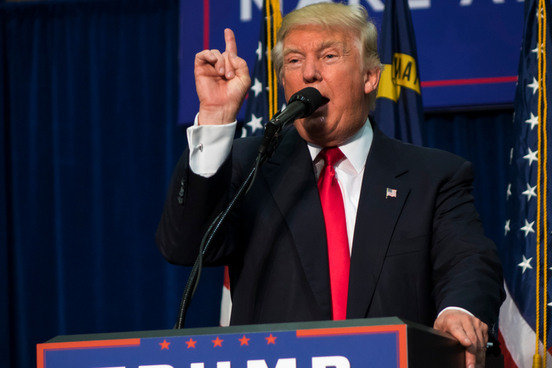10 of the most important English words of 2017 according to Merriam-Webster
Recently, Merriam-Webster published the 10 most popular words of 2017: it was their users who searched most often in the outgoing year. We have translated and adapted an article about this for those who are learning English and want to better understand the meaning of these words.

The main word of 2017 according to Merriam-Webster is feminism. This word was popular throughout the year with several sharp jumps that corresponded to various news and events. The general increase in the number of search queries suggests that many people were interested in this word, and specific jumps explained why.
The word "feminism" has repeatedly appeared in the news reports on the Women's March in Washington in January (and other related marches held throughout the country and internationally) and subsequent discussions about whether the march was feminist and what feminism was represented by the organizers and participants. The number of requests grew again when Kelliann Conway said during the interview that she did not consider herself a feminist. In this case, the definition of feminism itself was the subject of news - it became an occasion for many people to look for this word.
')
Interest in the dictionary definition of the word "feminism" was also caused by the sphere of entertainment: many began to look for him after the release of the TV series "The Handmaid's Tale" and the movie "Wonder Woman".
More recently, inquiries for the definition of the word “feminism” have increased due to numerous news reports on sexual abuse and harassment. Many women are in favor of sharing their stories with journalists, even more women have connected on social networks, using the hashtag #MeToo ("I, too,") to tell that they have also been subjected to similar harassment. The news was about resignations, layoffs and dismissals of men who were accused of sexual harassment or assault.
Today’s definition of feminism reads: “feminism is a theory of political, economic and social equality of the sexes” and “organized activities on behalf of the rights and interests of women”.

Complicit (being mixed up) was also popular throughout the year, mainly because of politics and the show “Saturday Night Live”.
The word "complicit" means "helping to commit a crime or to do something wrong." It comes from the Latin word meaning “put together”.
During the year, this word was used in relation to the Trump administration: firstly, whether members of the Trump administration were complicit in James Komi’s dismissal, and then they were complicit in Russian disinformation campaigns designed to disrupt the 2016 elections. Other politicians used this word, trying to distance themselves from the Trump administration.
But the biggest jumps in requests for this word were associated with President Trump’s daughter Ivanka. The word was often searched for in March, when she replied that “she doesn’t know what it means to be mixed up” to the question of Gayle King whether she and her husband were involved in what is happening in the White House. Search rates have increased again after the parody of Ivanka in the show “Saturday Night Live”.

This year, the search for the word “recuse” (withdraw from participation; self-withdrawal) increased several times, and all the sharp leaps were associated with Attorney General Jeff Seshn.
In January, Sessions refused to participate in investigative proceedings that the Department of Justice could take against Hillary Clinton because he publicly accused her during the presidential campaign, which led many to question his ability to be impartial.
However, at the end of this year, Republicans called on Sessions to investigate Hillary Clinton and the alleged Clinton Foundation ties with the so-called Uran-1 deal with a Russian state company. The views increased again when people remembered that Sessions pulled away, and then claimed that the investigation did not matter.
The views again appeared in March, when other members of Congress called on Sessions to refuse to participate in any investigations by the US Department of Justice about collusion between Russia and any members of the Trump cabinet or administration, because Sessions did not report that he had spoken to the Russian ambassador in 2016.
“Recuse” means “to disqualify yourself as a judge in a particular court case” and “refuse to participate in order to avoid a conflict of interests”. The word “recuse” came into English from French and ultimately goes back to the Latin word recusare (which means “oppose or refuse”).

Although in 2017 this word did not appear in any major events, empathy, nevertheless, was one of the top queries throughout the year.
It was often used in articles criticizing Trump or Republicans for lack of empathy in their comments or proposed bills, and was also discussed as one of the main desired results of the #MeToo campaign.
The biggest event that led to his appearance in the news took place in January, when Asghar Farhadi, an Iranian film director nominated for the Best Foreign Language Film category for his traveling salesman, refused to go to the United States in protest against Trump’s ban on entry of citizens of some countries (including Iran). His statement ended with a powerful call for "empathy between all of us, the empathy we need today."
The word “empathy” means “empathy, the ability to put oneself in the place of another” and is derived from the Greek word meaning “emotional.”

The old-fashioned word “dotard” returned again in September when the Korean Central News Agency released comments from North Korean President Kim Jong-un, who called Donald Trump "a mentally abnormal American senile." The query for the word “dotard” (pronounced [ˈdoʊtəd]) increased by 35,000% compared to last year, although it was not the most viewed word of 2017.
The word “dotard” means “a person who has fallen into dementia” and originally meant “imbecile” when it only began to be used in the 14th century.
This word has a halo of old-fashionedness, and some journalists believe that the choice of such a strange word can be attributed to outdated English-Korean dictionaries used in translating Kim Jong-un's comments.

The word “syzygy” (pronounced [ˈsɪzɪdʒi]) abruptly gained a number of views on August 21, 2017, on the day of the total solar eclipse that could be observed in North America.
We define the word “syzygy” as “an almost straightforward configuration of three celestial bodies (such as the Sun, Moon, and Earth during a solar or lunar eclipse) in a gravitational system.” The word comes from the Greek "syzygos", which means "mixed together," and is used to refer to astronomical events from the seventeenth century.
The number of requests for the word “syzygy” increased slightly in early December due to the super moon.

The words that are searched in the dictionary are not always political, and the “gyros” is proof of this. The word appeared in March, when the widely known sketch “The Tonight Show” featuring Jimmy Fallon and country singer Luke Brian began with the fact that they ordered food in New York, and ended with a music video for a song called “I don't Know How to Pronounce Gyro ”(“ I don’t know how to pronounce “gyros”).
So how do you pronounce "gyros"? It depends on what gyro is meant. An earlier gyro is an abbreviation of the words gyroscope and gyrocompass, and its pronunciation is based on the pronunciation of both of these words, i.e. / JEYE-roh /. It began to be used at the very beginning of the 1900s.
Then, around 1970, the word "gyros" was introduced into English from Greek cuisine. The lavash-wrapped slices of meat, the main ingredient of the gyros, came from the Greek verb “gyros” (“to wrap”), but this more recent borrowing was accompanied by the phonetic rules of the Greek language, not English, which gave us / YEE-roh / and / ZHIHR-oh / as common pronunciation methods. The definition of this type of gyros is “sandwich with lamb meat and beef, tomatoes, onions and yoghurt sauce in pita bread”.

Words related to political and economic systems have been in search tops for many years, and 2017 is no exception. The word “federalism” was often searched for in September, when the fate of the “Law on Accessible Medical Care” was decided in Congress.
Lindsay Graham, one of the senatorial co-authors of the bill that would transfer control of the federal health care market to individual states, became a source of views this year.
Although the merits of the Graham-Cassidy bill were discussed in Congress and publicly, Graham noted that passing the bill would stop what he considers to be the inevitable adoption of a single payer system in America:
The number of views of this word has increased by almost 500% compared with what it was in 2016. We define federalism as “the distribution of power in an organization (for example, in a government) between the central authority and its constituent parts”.

Important meteorological events often lead to an increase in requests for them online, and this year gave us several major events that we were tracking: hurricanes Harvey, Irma, Jose and Maria - all of them caused enormous damage to the southeastern US and the Caribbean. The word "hurricane" was the main query in early September, as these storms hit the islands and coasts.
Requests for the word "hurricane" often rise during and after hurricanes, although this is hardly related to ignorance of what a hurricane is: people search for this word to get more detailed information about the event and the latest news.
For those interested in the dictionary meaning of the word “hurricane”: it is “a tropical cyclone with winds of 74 miles (119 kilometers) per hour or more, which appears mainly in the western part of the Atlantic Ocean, usually accompanied by rain, thunder, lightning and sometimes moves in temperate latitudes. "
The word came to English in the middle of the 16th century from the Spanish “huracán”, which, in turn, came from the language of the aborigines of Taino (hurakán).

This year, requests for the word “gaffe” began to increase, starting in February, after a sudden and extremely awkward moment at the climax of the Oscar ceremony.
The nominees were listed, and then the award for the best film was awarded to the film "La La Land." Then, two minutes later, when the La La Land stars made a speech of appreciation on the stage, everything abruptly stopped and it became clear that the wrong envelope was given to the speakers. The real winner - the movie "Moonlight" - was announced to a completely puzzled audience.
The word “gaffe” is defined as a “blunder”, and although this word is often applied to mistakes in the social sphere, it can refer to any mistakes. Given the scale and large audience of this particular error, it is not surprising that the “mistake with the envelope” was analyzed within a few months after the Oscar.
Readers of the blog give a coupon for 500 rubles for the purchase of a subscription, which includes 8 types of training and weekly mailings about English grammar and vocabulary - "Vitaminki" and "Buns".
And for unlimited and perpetual access to all features of the site there is an “All Inclusive” tariff (the discount does not apply).
1. Feminism - feminism

The main word of 2017 according to Merriam-Webster is feminism. This word was popular throughout the year with several sharp jumps that corresponded to various news and events. The general increase in the number of search queries suggests that many people were interested in this word, and specific jumps explained why.
The word "feminism" has repeatedly appeared in the news reports on the Women's March in Washington in January (and other related marches held throughout the country and internationally) and subsequent discussions about whether the march was feminist and what feminism was represented by the organizers and participants. The number of requests grew again when Kelliann Conway said during the interview that she did not consider herself a feminist. In this case, the definition of feminism itself was the subject of news - it became an occasion for many people to look for this word.
')
Interest in the dictionary definition of the word "feminism" was also caused by the sphere of entertainment: many began to look for him after the release of the TV series "The Handmaid's Tale" and the movie "Wonder Woman".
More recently, inquiries for the definition of the word “feminism” have increased due to numerous news reports on sexual abuse and harassment. Many women are in favor of sharing their stories with journalists, even more women have connected on social networks, using the hashtag #MeToo ("I, too,") to tell that they have also been subjected to similar harassment. The news was about resignations, layoffs and dismissals of men who were accused of sexual harassment or assault.
Today’s definition of feminism reads: “feminism is a theory of political, economic and social equality of the sexes” and “organized activities on behalf of the rights and interests of women”.
2. Complicit - to be mixed

Complicit (being mixed up) was also popular throughout the year, mainly because of politics and the show “Saturday Night Live”.
The word "complicit" means "helping to commit a crime or to do something wrong." It comes from the Latin word meaning “put together”.
During the year, this word was used in relation to the Trump administration: firstly, whether members of the Trump administration were complicit in James Komi’s dismissal, and then they were complicit in Russian disinformation campaigns designed to disrupt the 2016 elections. Other politicians used this word, trying to distance themselves from the Trump administration.
But the biggest jumps in requests for this word were associated with President Trump’s daughter Ivanka. The word was often searched for in March, when she replied that “she doesn’t know what it means to be mixed up” to the question of Gayle King whether she and her husband were involved in what is happening in the White House. Search rates have increased again after the parody of Ivanka in the show “Saturday Night Live”.
3. Recuse - refuse to participate

This year, the search for the word “recuse” (withdraw from participation; self-withdrawal) increased several times, and all the sharp leaps were associated with Attorney General Jeff Seshn.
In January, Sessions refused to participate in investigative proceedings that the Department of Justice could take against Hillary Clinton because he publicly accused her during the presidential campaign, which led many to question his ability to be impartial.
However, at the end of this year, Republicans called on Sessions to investigate Hillary Clinton and the alleged Clinton Foundation ties with the so-called Uran-1 deal with a Russian state company. The views increased again when people remembered that Sessions pulled away, and then claimed that the investigation did not matter.
The views again appeared in March, when other members of Congress called on Sessions to refuse to participate in any investigations by the US Department of Justice about collusion between Russia and any members of the Trump cabinet or administration, because Sessions did not report that he had spoken to the Russian ambassador in 2016.
“Recuse” means “to disqualify yourself as a judge in a particular court case” and “refuse to participate in order to avoid a conflict of interests”. The word “recuse” came into English from French and ultimately goes back to the Latin word recusare (which means “oppose or refuse”).
4. Empathy - empathy

Although in 2017 this word did not appear in any major events, empathy, nevertheless, was one of the top queries throughout the year.
It was often used in articles criticizing Trump or Republicans for lack of empathy in their comments or proposed bills, and was also discussed as one of the main desired results of the #MeToo campaign.
The biggest event that led to his appearance in the news took place in January, when Asghar Farhadi, an Iranian film director nominated for the Best Foreign Language Film category for his traveling salesman, refused to go to the United States in protest against Trump’s ban on entry of citizens of some countries (including Iran). His statement ended with a powerful call for "empathy between all of us, the empathy we need today."
The word “empathy” means “empathy, the ability to put oneself in the place of another” and is derived from the Greek word meaning “emotional.”
5. Dotard - the crazy old man, marazmatic

The old-fashioned word “dotard” returned again in September when the Korean Central News Agency released comments from North Korean President Kim Jong-un, who called Donald Trump "a mentally abnormal American senile." The query for the word “dotard” (pronounced [ˈdoʊtəd]) increased by 35,000% compared to last year, although it was not the most viewed word of 2017.
The word “dotard” means “a person who has fallen into dementia” and originally meant “imbecile” when it only began to be used in the 14th century.
This word has a halo of old-fashionedness, and some journalists believe that the choice of such a strange word can be attributed to outdated English-Korean dictionaries used in translating Kim Jong-un's comments.
6. Syzygy - syzygy

The word “syzygy” (pronounced [ˈsɪzɪdʒi]) abruptly gained a number of views on August 21, 2017, on the day of the total solar eclipse that could be observed in North America.
We define the word “syzygy” as “an almost straightforward configuration of three celestial bodies (such as the Sun, Moon, and Earth during a solar or lunar eclipse) in a gravitational system.” The word comes from the Greek "syzygos", which means "mixed together," and is used to refer to astronomical events from the seventeenth century.
The number of requests for the word “syzygy” increased slightly in early December due to the super moon.
7. Gyro - gyros

The words that are searched in the dictionary are not always political, and the “gyros” is proof of this. The word appeared in March, when the widely known sketch “The Tonight Show” featuring Jimmy Fallon and country singer Luke Brian began with the fact that they ordered food in New York, and ended with a music video for a song called “I don't Know How to Pronounce Gyro ”(“ I don’t know how to pronounce “gyros”).
So how do you pronounce "gyros"? It depends on what gyro is meant. An earlier gyro is an abbreviation of the words gyroscope and gyrocompass, and its pronunciation is based on the pronunciation of both of these words, i.e. / JEYE-roh /. It began to be used at the very beginning of the 1900s.
Then, around 1970, the word "gyros" was introduced into English from Greek cuisine. The lavash-wrapped slices of meat, the main ingredient of the gyros, came from the Greek verb “gyros” (“to wrap”), but this more recent borrowing was accompanied by the phonetic rules of the Greek language, not English, which gave us / YEE-roh / and / ZHIHR-oh / as common pronunciation methods. The definition of this type of gyros is “sandwich with lamb meat and beef, tomatoes, onions and yoghurt sauce in pita bread”.
8. Federalism - Federalism

Words related to political and economic systems have been in search tops for many years, and 2017 is no exception. The word “federalism” was often searched for in September, when the fate of the “Law on Accessible Medical Care” was decided in Congress.
Lindsay Graham, one of the senatorial co-authors of the bill that would transfer control of the federal health care market to individual states, became a source of views this year.
Although the merits of the Graham-Cassidy bill were discussed in Congress and publicly, Graham noted that passing the bill would stop what he considers to be the inevitable adoption of a single payer system in America:
“This is the choice for America: socialism or federalism when it comes to your healthcare.”
The number of views of this word has increased by almost 500% compared with what it was in 2016. We define federalism as “the distribution of power in an organization (for example, in a government) between the central authority and its constituent parts”.
9. Hurricane - Hurricane

Important meteorological events often lead to an increase in requests for them online, and this year gave us several major events that we were tracking: hurricanes Harvey, Irma, Jose and Maria - all of them caused enormous damage to the southeastern US and the Caribbean. The word "hurricane" was the main query in early September, as these storms hit the islands and coasts.
Requests for the word "hurricane" often rise during and after hurricanes, although this is hardly related to ignorance of what a hurricane is: people search for this word to get more detailed information about the event and the latest news.
For those interested in the dictionary meaning of the word “hurricane”: it is “a tropical cyclone with winds of 74 miles (119 kilometers) per hour or more, which appears mainly in the western part of the Atlantic Ocean, usually accompanied by rain, thunder, lightning and sometimes moves in temperate latitudes. "
The word came to English in the middle of the 16th century from the Spanish “huracán”, which, in turn, came from the language of the aborigines of Taino (hurakán).
10. Gaffe - misstep

This year, requests for the word “gaffe” began to increase, starting in February, after a sudden and extremely awkward moment at the climax of the Oscar ceremony.
The nominees were listed, and then the award for the best film was awarded to the film "La La Land." Then, two minutes later, when the La La Land stars made a speech of appreciation on the stage, everything abruptly stopped and it became clear that the wrong envelope was given to the speakers. The real winner - the movie "Moonlight" - was announced to a completely puzzled audience.
The word “gaffe” is defined as a “blunder”, and although this word is often applied to mistakes in the social sphere, it can refer to any mistakes. Given the scale and large audience of this particular error, it is not surprising that the “mistake with the envelope” was analyzed within a few months after the Oscar.
For those who want to pump English
Readers of the blog give a coupon for 500 rubles for the purchase of a subscription, which includes 8 types of training and weekly mailings about English grammar and vocabulary - "Vitaminki" and "Buns".
And for unlimited and perpetual access to all features of the site there is an “All Inclusive” tariff (the discount does not apply).
Source: https://habr.com/ru/post/345238/
All Articles